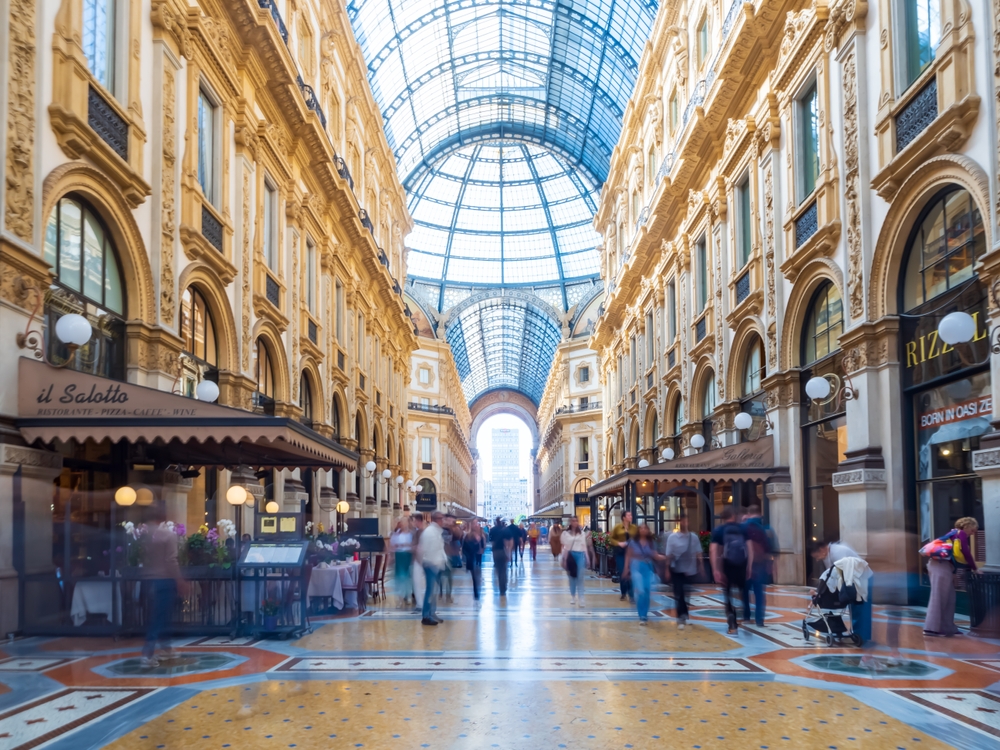Any country not continually innovating, striving to create better material and civil conditions for the next generation, runs the risk of becoming economically impotent, politically irrelevant, and culturally ossified. This was the main issue discussed at this year’s Communion and Liberation meeting in Rimini, Italy. Over seven days in late August, tens of thousands of Catholic public intellectuals, academics, and concerned Europeans rallied around the theme “If we are not looking for the essential [of what it means to be human], then what are we looking for?” The annual international meeting, drawing in many celebrity intellectuals of the free society, was not merely a philosophical exercise or some ongoing “Catholic Woodstock,” full of daydreamers instead of doers. Several panels and plenary discussions focused son practical solutions to counter Italy’s stagnate economy and the ancillary social implications.
“The welfare of a country is not secured by its reliance on the state, but by the initiatives and creativity of its people,” said Benedetto Delle Site, president of Italy’s Union of Young Entrepreneurs and Executives, during one of the breakout sessions.
Targeting cumbersome institutional barriers, Delle Site spoke on the necessity of having the “wealth produced by talent and creativity” invested directly “by private entities in social, cultural and educational works” instead of by the ineffective “bureaucratic machinery of the state.” This, he argued, would not only enhance the “principles of proximity and subsidiarity” but also buttress the “widespread need for lower taxation.”
Another key speaker present at the meeting was Giancarlo Giorgetti, Italy’s Economy and Finance minister. Giorgetti similarly emphasized the importance of human capital as the “main determinant of growth and productivity.” This reflection was underscored by his urgent reminder that “the entrepreneur is the determining factor of [economic] development.” His call for a more open, dynamic economy assumed a dire tone, even as he urged the ushering in of a new commercial Renaissance in Italy, which has suffered a stagnant GDP for the past 25 years.
Giorgetti and others focused on explaining endogenous growth theory, which posits that technological progress, innovation, and human capital (education, training, and skill development) are the main drivers of long-term economic growth. Knowledge, a nonrival good, and human capital exhibit increasing returns that scale. Hence, the more that is accumulated, the higher the rate of return for free markets, thereby leading to sustained, long-term economic growth.
Overcoming the challenges in the Italian economy requires gumption, determination, and creativity, not to mention much risk-taking. In practice it also requires a deep reversal of the substantial bureaucratic barriers that discourage young entrepreneurs, stunting their creativity and, with that, innovation and economic development.
According to the 2023–24 Global Entrepreneurship Monitor report, the level of entrepreneurial activity remains structurally low in Italy compared to other industrialized countries. In 2023, Italy was positioned near the bottom—36th out of the 46 countries ranked. The report observed that one of the main factors contributing to this ranking was the low level of entrepreneurship training.
One of the primary consequences of an anemic entrepreneurial ecosystem is brain drain, or the outflow of educated young people, talented innovators, and entrepreneurs. Between 2008 and 2022, more than 525,000 young Italians left Italy for work abroad, with only 33% ever repatriating. A 2024 survey by Ipsos found that 35% of Italians under the age of 30 were willing to move abroad for greater economic opportunities and to seek more supportive and flexible environments with higher compensation.
Massimo Anelli, associate professor in the Department of Social Sciences and Politics at Bocconi University in Milan, found in his research that this trend had a negative impact on business creation. “For every 1,000 emigrants between 2008 and 2015, about 36 fewer businesses were created per year,” Anelli noted. This observation was particularly alarming given that the “flight of entrepreneurs is particularly strong for businesses created by people under the age of 45 and for innovative startups.” The fear is that this trend, far from being a transitory phenomenon, has become a permanent feature of the Italian economy.
This problem is made worse by a lack of venture capital and angel investment opportunities in Italy. While there are dozens of VC firms in Rome, Florence, and Milan, many of them of foreign run and funded and unable to compete with the “shark tank” culture of the United States, which places far more trust in novice business owners. Without these crucial funding sources, start-ups and entrepreneurs struggle to scale their businesses, forcing them either to abandon their innovative projects or to relocate to environments where investors are more willing to take risks on new business concepts.
Another inhibiting factor is the political-fiscal-regulatory structures that encourage “play it safe” measures and attitudes, favoring stability and security over risk and opportunity. This manifests itself in two ways. First, many of those who pursue higher education prefer careers in safer and what are culturally perceived as more prestigious sectors (healthcare, law, government) rather than venture into the murky waters of entrepreneurship.
Second, this results in the quest for securing a “post fisso,” that is, a full-time, bulletproof permanent contract managed by Italy’s bulwark of labor unions. Such permanent employment is often seen as a life goal—a symbol of security, stability, and social status. This security comes at a cost, however: It limits the country’s economic growth and prevents Italy from harnessing the potential of its entrepreneurial citizens.
It should be noted that Italy is a safe and stable nation, with an unrivaled cultural patrimony—it has 60 UNESCO World Heritage sites, the most of any country in the world. There is a need, a moral imperative, and an obligation to maintain, cherish, and preserve ancient cultural heritage for posterity. At the same time, Italy runs the risk of becoming a place that time forgot, a museum, rather than a dynamic area for future development. Preservation and innovation should not be cast as diametrically opposed but as complementary.
There is a competitive advantage—a necessity—to risk-taking, as it fuels innovation, disrupts outdated industries, and promotes economic growth. It is the mechanism through which new ideas are transformed into tangible products and services that improve lives. In this way, it also serves the common good.
Pope Francis touched upon this during an August 2023 address to French entrepreneurs, reflecting on the moral goodness of entrepreneurship and noting that entrepreneurs are “key players of development and well-being,” as well as “an essential engine of wealth, prosperity and public happiness.”
“Indeed, it is impossible today to imagine any improvement in the Common Good, in other words in economic and social life, in justice, in the living conditions of the poorest, without considering businesspeople as agents of development and well-being,” the pope concluded.
To unleash this creative potential and to invest in the future, Italy must embrace reforms that allow for a freer market that will reinvigorate its entrepreneurial spirit. This starts with reducing the heavy hand of government in business regulation and allowing for more private-sector investment. In practical terms, the Italian government should reduce the regulatory burden and bureaucratic obstacles associated with starting a business, including reducing fees, offering legal and financial support to entrepreneurs, and ensuring tax breaks for businesses that invest in research and development.
France has implemented the “La French Tech” initiative, which includes a variety of tax incentives, grants, and loans for start-ups in innovative industries. This program has helped position France as a global player in tech entrepreneurship, attracting both domestic and international investors. Italy could adopt a similar approach, focusing on sectors where it has historical strengths—such as design, fashion, and manufacturing—but also targeting emerging industries such as technology, renewable energy, and artificial intelligence.
Equally important is the role of education. Italy must reform its educational system to encourage creativity, critical thinking, and problem-solving from an early age, all of which are key underpinnings to entrepreneurship.
“Entrepreneurship and innovation are applied creativity,” says Dr. Orin Davis, HR and start-up adviser at Quality of Life Laboratory Consulting, in an email exchange. “The uniqueness we exhibit in being creative allows us to fulfill our indivisible potential, and to self-actualize and self-transcend.”
The current educational system, something I witnessed firsthand as a graduate student in Italy, too often prioritizes traditional career paths and discourages students from exploring entrepreneurial avenues. Moreover, the curriculum tends to be overly theoretical and reliant on rote memorization.
“Theory is actually critical as a baseline, and a great many entrepreneurial endeavors fail because their theory is poor,” Davis explained. But he went on to say that true creativity is a byproduct of trial and error, not merely theory.
“The main problem in education is the overemphasis on being right and getting the right answer and getting things right the first time,” Davis continued. “That’s not realistic! We need to give kids room to experiment, fail, and bounce back, as real life (and hence any application of creativity to real life) is trial and error.” Entrepreneurship, then, should not be viewed as a high-risk, high-reward outlier in the economy but as a standard and achievable career goal, one that will lead Italy into the future.
At the institutional level, the Italian Ministry of Education should introduce comprehensive reforms to ensure that creativity and entrepreneurship are integrated into the national curriculum. Denmark’s model of active learning via “Innovation Camps” encourages students to collaborate on entrepreneurial projects that challenge them to come up with creative solutions to business problems. Companies provide real business scenarios to students, who then brainstorm, prototype, and present ideas, bridging the gap between education and industry.
Italian universities can play a critical role in fostering creativity by partnering with industries to establish innovation hubs and incubators. The government could provide funding and tax incentives to universities and private companies that establish these creative hubs, ensuring that they are adequately resourced and accessible to a wide range of students and entrepreneurs.
Abraham Maslow, the American psychologist who created the hierarchy of human needs, insisted that creativity and self-actualization are conjoined. To self-actualize is to be free to pursue not that which is imposed but to tap into one’s innate creative potential unencumbered. This, in some respects, is similar to the Aristotelian concept of eudaimonia, or the positive and divine state of being that we can all aspire to.
Italy stands at a crossroads, with the potential either to become a hub of innovation and entrepreneurship or to continue down its current path of stagnation. The challenges faced by Italian entrepreneurs are substantial but not insurmountable. By embracing free-market reforms, increasing access to venture capital, and revamping its educational system, Italy can reclaim its entrepreneurial spirit and secure a prosperous future for generations to come. The path to innovation may be risky, but it is the nature of the game. It is a necessary high-seas journey for Italy to make as it parts ways with its many metaphorical safe harbors that serve only to discourage business ventures. Better to confidently embrace its native creative edge and re-establish its role as a world leader.

